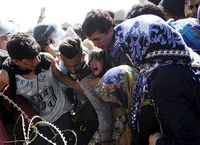FSB je džihadistom dostavljal kar - džihadiste. Bolje za njih, da harajo po Iraku in Siriji, kot Dagestanu.
http://www.thedailybeast.com/a...ic-terror0.html
http://www.thedailybeast.com/a...ic-terror0.html
Citat:
“I know someone who has been at war for 15 years,” Akhyad Abdullaev, head of the village, tells Milashina. “He fought in Chechnya, Afghanistan, Iraq, and now in Syria. He surely cannot live peacefully. If such people go off to war, it’s no loss. In our village there is a person, a negotiator. He, together with the FSB, brought several leaders out of the underground and sent them off abroad on jihad. The underground resistance has been weakened, we’re well off. They want to fight—let them fight, just not here.”
Milashina next interviews the “negotiator” Abdullaev mentions. He tells her of his role as an intermediary between the FSB and local militants in arranging the latter’s departure to the Levant. In 2012, for instance, he helped arrange for a man known as the “emir of the northern sector”—a “very dangerous man,” believed by the FSB to have been behind several terrorist bombings—to go to Turkey if he agreed to quit jihadism in Dagestan. The FSB gave the emir a passport and acted as his travel agent. The condition was that he’d deal exclusively with the FSB and not inform any of his confederates of his true sponsor. The emir has since been killed in Syria, but the “negotiator” tells the journalist that he’s subsequently brought another five militants to the FSB who benefited from the same quid pro quo arrangement. “This was in 2012,” he says. “Just before the Syrian path opened up. More precisely, [the FSB] opened it.”
So far the tactic of encouraging hijrah, or jihadist emigration, has appeared to help the Russian government pacify its decades-long insurgency in the North Caucasus. Akhmet Yarlya, a researcher at Moscow State Institute of International Relations’s Center of the Problems of the Caucasus and Regional Security, a group attached to Russia’s Foreign Ministry, has estimated that between 2,000 and 3,000 Islamic militants have joined ISIS in the Middle East. By all accounts, the result has been great for counterterrorism officials, who are now able to claim direct credit for seeing terrorist violence in the region halved since the Syria crisis kicked off.








